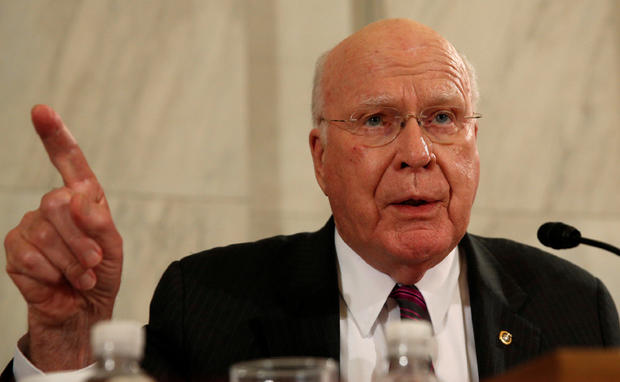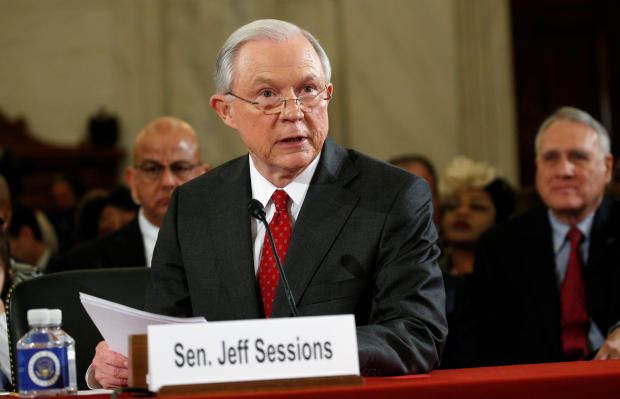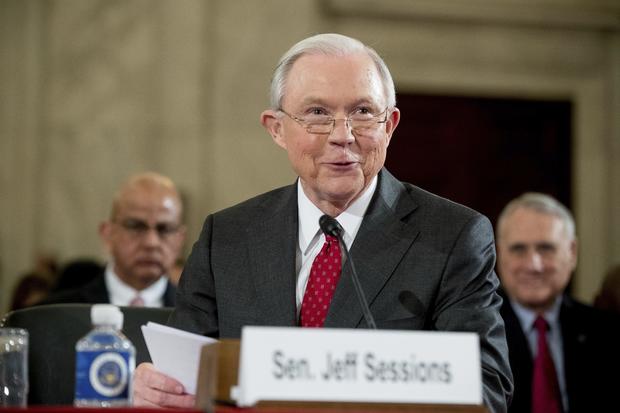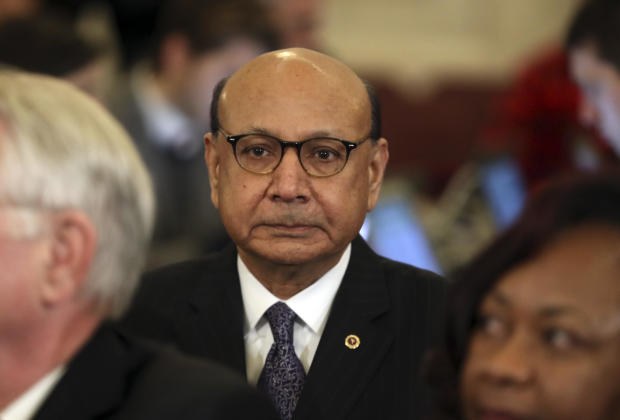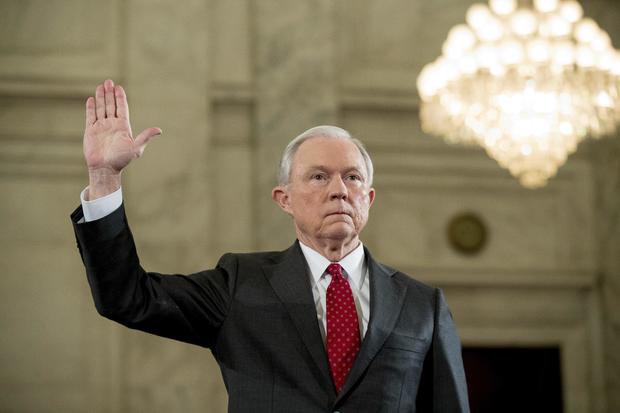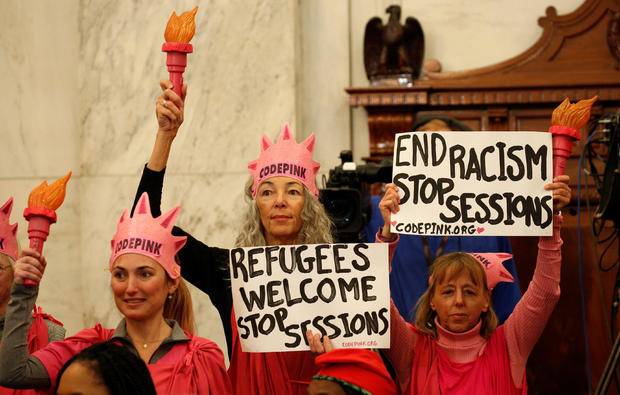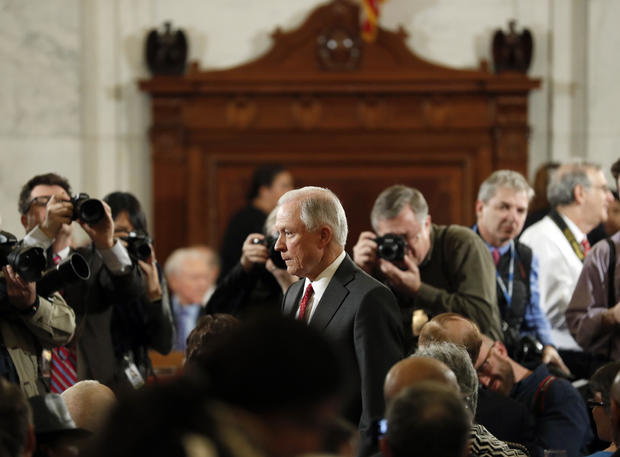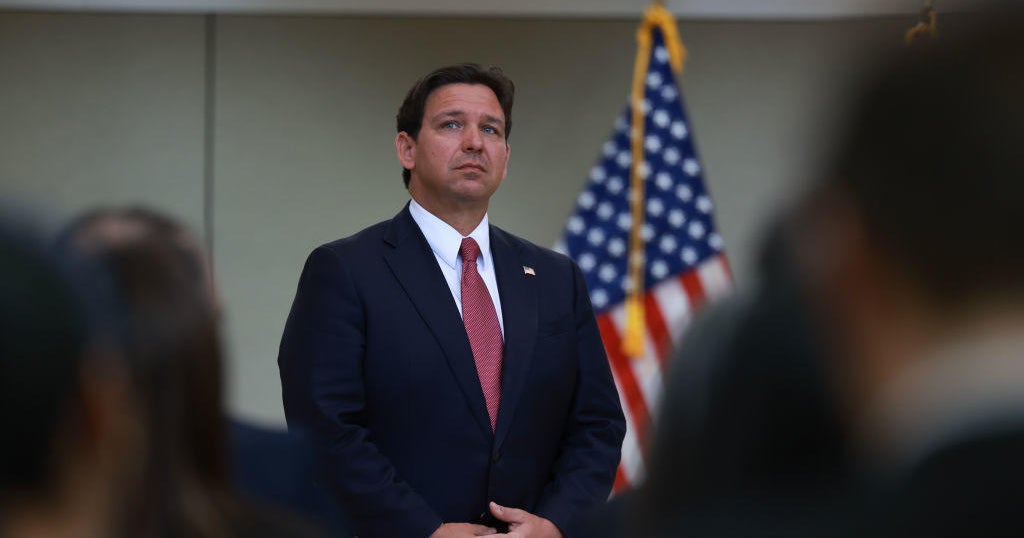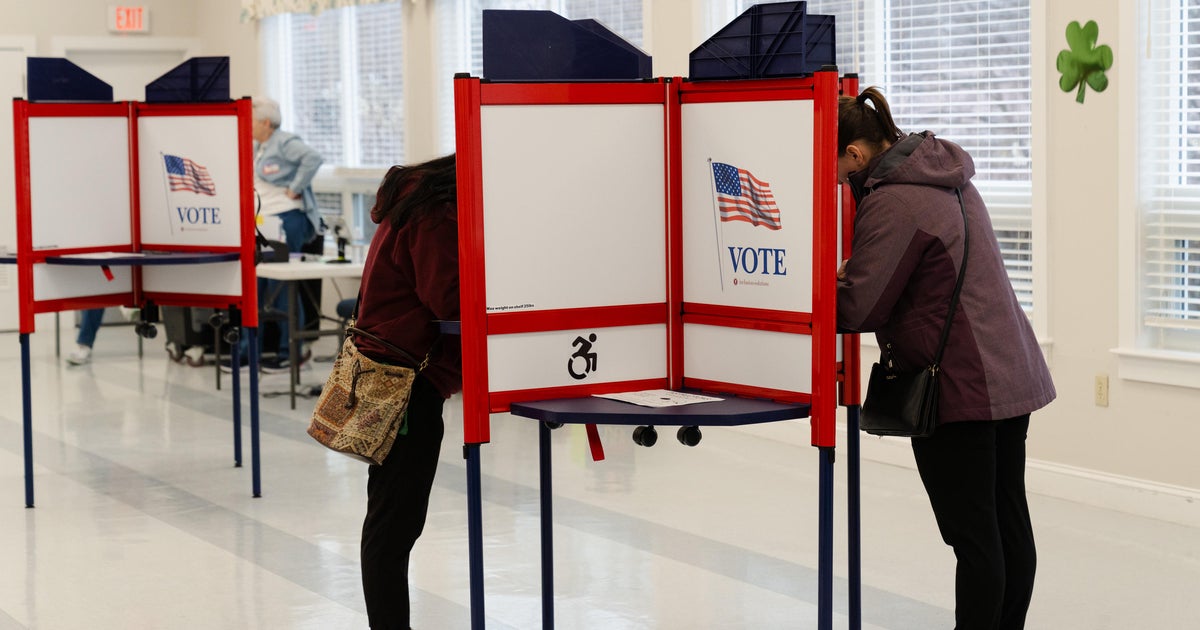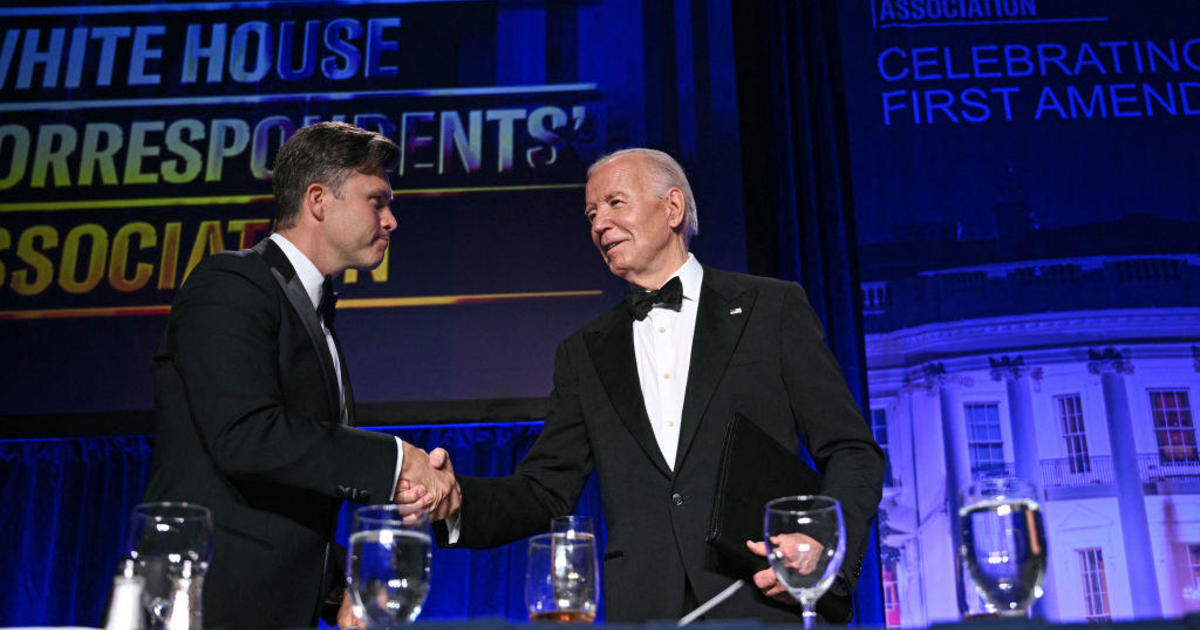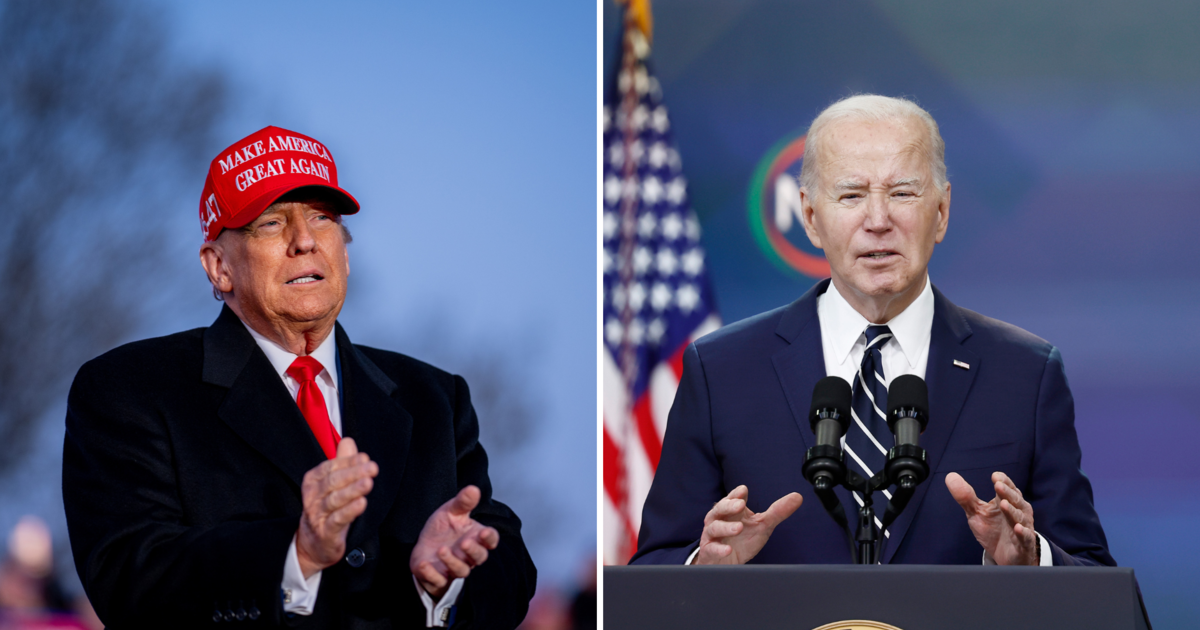Jeff Sessions' confirmation hearing for attorney general -- live blog
Sen. Jeff Sessions, R-Alabama, is testifying before the Senate Judiciary Committee Tuesday for his confirmation hearing to become President-elect Donald Trump’s attorney general. Some of the witnesses expected to testify include former Attorney General Michael Mukasey, NAACP Cornell Brooks, Fraternal Order of Police President Chuck Canterbury, Rep. John Lewis, D-Georgia and Sen. Cory Booker, D-New Jersey.
Check out three things to watch for during the hearing from CBS News’ Paula Reid.
Day 2
3:00 p.m. ET
Chair of the Congressional Black Caucus Rep. Cedric Richmond, D-Louisiana, expressed concerns about Booker’s and Lewis’ places in the hearing lineup of witnesses.
“To have a senator, a House member, and a living civil rights legend testify at the end of all of this is the equivalent of being made to go to the back of the bus,” said Richmond, who spoke against Sessions.
2:30 p.m. ET Rep. John Lewis, D-Georgia, also addressed the committee Wednesday, following Booker’s appeal to his colleagues.
People “wonder whether Sessions’ call for law and order means what it did in Alabama when I was growing up,” said Lewis, a civil rights icon who suffered under Jim Crow segregation.
1:30 p.m. ET In an unusual move for a fellow senator, Cory Booker, a Democrat from New Jersey, is testifying against Sen. Sessions.
Sessions may not “aggressively pursue the congressional mandate of civil rights, equal rights, and justice for all of our citizens,” Booker told the Senate Judiciary Committee Wednesday. Booker specifically cited the Alabama senator’s opposition to reforming the criminal justice system in his opposition to Sessions. The role of attorney general, Booker added, “requires a more courageous empathy than Sen. Sessions’ record demonstrates.”
“I know that some of my colleagues are unhappy that I’m breaking with Senate tradition to testify against the nomination of one of my colleagues,” Booker said. “But I believe, like perhaps all of my colleagues, that in the choice between standing with Senate norms or standing up for what my conscience tells me is best for our country, I will always choose conscience and country.”
1:00 p.m. ET Former Attorney General Michael Mukasey came to Sessions’ defense at the hearing. He wrote in his testimony that “of all the insidious practices that have crept into our politics in recent times, I know of none more insidious than casual and unjustified accusations of racism, smears that once leveled are difficult to wipe clean.”
10:45 a.m. ET Senators begin to question witnesses on Sessions’ history on civil rights and his career as a prosecutor.
10:20 a.m. ET Several witnesses testify against Sen. Jeff Sessions, including Dr. Cornell Brooks, president and CEO of the NAACP, citing the Alabama senator’s record on voting and civil rights. Brooks said the organization “firmly believes” that
Some also testify on behalf of Sessions, including U.S. Civil Rights Commissioner Peter Kirsanow.
Day 1
4:30 p.m. Cruz continues to defend Sessions’ record and said there’s no other Trump nominee who has prosecuted Klansmen and put them on death row.
3:44 p.m. Feinstein began discussing U.S. internment camps that detained Japanese people and asked Sessions if he can assure that no American citizen can be held indefinitely without charge or trial pursuant to the use of military force.
“Senator Feinstein, that’s an important question. Classifically, the answer is yes,” Sessions said at first, as if he didn’t understand her question.
He then clarified that, “These individuals would have to be proven to be connected to a designated enemy of the United States.”
“They cannot be detained without undergoing a habeas review and the government will have to prove that they are connected with an enemy of the United States,” he said.
3:22 p.m. Speaking about the investigation into Russian interference in the election, Durbin asked if Sessions would recuse himself as attorney general if the probe involve the Trump campaign or associates of the president-elect.
“My recusal issue was because I had made public comments about it that could be construed on the final judgment on it,” Sessions said about his earlier announcement about recusing himself from Clinton investigations.
“I will review it and try to do the right thing,” Sessions said.
Durbin said that it would be “an obvious case for special prosecutor.”
3:05 p.m. Leahy questioned Sessions again and asked Sessions about the Access Hollywood tape featuring Trump’s lewd remarks about women: “Is grabbing a woman by her genitals, without consent, is that sexual assault?
“Clearly it would be,” Sessions said.
Leahy pressed him again to answer that question and Sessions said, “Yes.”
2:44 p.m. Sen. Mazie Hirono, D-Hawaii, asked Sessions what he would characterize as an extreme view in relation to Mr. Trump’s proposal for extreme vetting.
“First of all, the vetting process is in the hands of the State Department and the consular offices,” Sessions said, adding that the approach that’s “preferable” is focusing on people who are based in areas “where we have an unusually high risk of terrorists coming in.”
Hirono expressed concern that the Supreme Court, during the Trump administration, would reverse Roe v. Wade. Sessions said he didn’t want to comment on hypotheticals and that it’s the law of the land.
2:18 p.m. Sen. Richard Blumenthal, D-Connecticut, asked Sessions if he will recuse himself from voting on his own nomination or other Trump nominees.
Sessions said he has not planned on voting on his own nomination and he suggested it would be a conflict of interest or violation of ethics rules to vote on other nominations as well.
Blumenthal asked Sessions if he would appoint an independent prosecutor if Trump is found to be in violation of the emoluments clause. He said he wouldn’t commit at this time to appointing one and that it would have to be examined.
2:16 p.m. Sen. Ted Cruz, R-Texas, defended Sessions against the attacks from Democrats on his record defending minorities and voting rights.
1:53 p.m. The hearing has resumed and Sen. Chris Coons, D-Delaware, asked Sessions about his view regarding the use of hitching posts or chain gangs in Alabama prisons.
Sessions said that the Supreme Court’s ruling that those methods constituted torture is “crystal clear” and that he doesn’t favor them.
Coons said that Sessions has defended the use of enhanced interrogation practices and it’s clear now that the laws prohibit torture. He asked if the president attempts to override that authority, what action would he take. Sessions didn’t exactly give a direct answer and Coons said that the ban on torture is a law that needs to be enforced and Sessions appeared to agree.
1:10 p.m. The hearing has gone on recess for about 30 minutes.
12:51 p.m. Sen. Al Franken, D-Minnesota, said that in 2009, Sessions was interviewed as the ranking republican on the committee. In that interview, Franken noted that Sessions claimed he had filed 20 to 30 civil rights cases to desegregate schools when he served as a U.S. attorney.
“Did I misread that quote?” Franken asked.
“I believe that’s what I’ve been quoted as saying,” Sessions responded.
Sessions then admitted that the records don’t show that it was 20 to 30 and that “the number would be less than that.”
Franken said that the questionnaire Sessions had to complete for the committee for his confirmation hearing asked him to described 10 of the most significant litigated matters he personally handled. Franken said that among the cases listed, three were voting rights cases and a desegregation case.
Franken said that last week, three former Justice Department attorneys wrote an op-ed claiming that Sessions had no substantive involvement in any of the voting rights cases. Sessions said that those attorneys are distorting his record.
12:32 p.m. Sen. Amy Klobuchar, D-Minnesota, asked Sessions to explain his previous comment in which he described the Voting Rights Act as an “intrusive piece of legislation” and asked him how he’ll actively enforce the remaining pieces of the law such as the one that prohibits voting practices that discriminate on the basis of race.
“The Voting Rights Act passed in 1965 was one of the most important acts to deal with racial difficulties that we face,” Sessions said. “It changed the whole course of history particularly in the south.”
Sessions acknowledged that states systematically denied people the right to vote, specifically blocking black people from voting.
“It was just wrong and the Voting Rights Act confronted that,” Sessions said.
Sessions was asked about states’ voter ID laws and he said, “I think voter ID laws, properly drafted, are okay.”
Klobuchar also asked Sessions if he has any reason to doubt the accuracy of the conclusion of the U.S. intelligence community that Russia used cyberattacks to influence the 2016 election.
“I have no reason to doubt that and have no evidence to indicate otherwise,” he said.
12:04 p.m. Sen. Sheldon Whitehouse, D-Rhode Island, asked Sessions if waterboarding constitutes torture.
“Congress has taken an action that makes it absolutely improper and illegal,” Sessions said regarding the use of waterboarding by the military or other agencies.
Whitehouse asked if the Justice Department and FBI will be allowed to continue investigating Russian interference in the 2016 election even if it leads to the Trump campaign, the president-elect’s interests and associates.
“If there are laws violated, and it can be prosecuted, of course you have to handle that in an appropriate way,” Sessions said.
Sessions added that he believes it’s appropriate for “a nation to retaliate against those actions” like cyberattacks involving the election.
Whitehouse also asked Sessions if he chanted “lock her up” during the election with Trump supporters.
“No, I did not...I don’t think,” Sessions said. “I heard it.”
11:43 a.m. Senate Minority Whip Dick Durbin, D-Illinois, asked Sessions why he opposed sentencing reform and has opposed President Obama’s commutations for low-level drug crimes.
Sessions said Durbin’s question was “unfair” and that they both did not agree on retroactivity in a sentencing reform bill.
“It’s not the attorney general’s decision whether a mandatory minimum should be imposed,” Sessions said.
11:29 a.m. Sen. Lindsey Graham, R-South Carolina, said he will “enthusiastically support” Sessions for attorney general. He asked whether he would advise Mr. Trump to end President Obama’s 2012 executive order that has deferred deportations for people who came to the U.S. illegally as children.
Sessions said it’s a decision that needs to be studied and that it’s really a memorandum of the Department of Homeland Security.
“It would certainly be Constitutional, I believe, to end it,” Sessions said. “It is very questionable in my opinion, Constitutionally.”
Graham asked what would happen to the hundreds of thousands of people who have come out of the shadows. Sessions said that Congress should be the branch that fixes the immigration system and “end the illegality.”
Graham asked Sessions if he believes the Russians were behind the cyberattacks during the 2016 election.
“I have done no research into that. I just know what the media has said about it,” Sessions said.
11:23 a.m. Leahy brought up President-elect Donald Trump’s proposed plan to ban Muslims from entering the United States and noted that Sessions voted against a resolution in the Senate that expressed that the U.S. must not bar people based on their religion. Leahy asked if he agrees with Mr. Trump that the U.S. can deny entry to members of a particular religion.
Sessions said that Mr. Trump has since made clear that he believes that the focus should be on people who are coming from countries with histories of terrorism. Sessions said his concern with the resolution was that you couldn’t “seriously consider” a person’s religious views during the vetting process.
“It is my belief and I do not support the idea that Muslims as a religious group should be denied admission to the United States,” he added.
11:11 a.m. Sen. Patrick Leahy, D-Vermont, the former ranking member on the panel, said he wanted to discuss the facts regarding his votes on the Violence Against Women Act. He pointed out that Sessions “strongly opposed” and voted against the reauthorization bill in 2013. Leahy asked why he voted against expanding protections for LGBTQ victims, immigrants and tribal victims of domestic violence.
“I did indeed support the bill in 2000,” Sessions said initially and Leahy said he was talking about the bill that is law today that Sessions opposed.
Leahy pointed out that the 2013 reauthorization of the measure passed “overwhelmingly” in both the Senate and GOP-controlled House at the time.
Sessions said that there was a “concerning provision” that gave tribal courts jurisdiction over non-tribal members. Leahy also asked
Sessions why he opposed his Matthew Shepard hates crimes bill. Sessions said he opposed it because state prosecutions were effectively handling those crimes.
11:02 a.m. Sen. Orrin Hatch, R-Utah, asked Sessions if he would consider as attorney general re-establishing a specific unit at the Justice Department to prosecute cases related to federal obscenity laws.
“I would consider that,” Sessions said, while adding that he wasn’t aware that such a unit had been previously disbanded.
Hatch also asked Sessions whether he agrees that Congress should pass legislation soon on rapid DNA analysis to help law enforcement. Sessions said such a law would present opportunities to solve crimes in a productive way.
He also asked Sessions about accusations that he had not supported the Violence Against Women Act. Sessions said he supported it in 2000 when it passed, supported versions of it in 2005 and supported a bill proposed by Grassley more recently. Sessions said it’s “frustrating to be accused of opposing Violence Against Women Act” and explained that there were specific add-on provisions in bills that made him concerned.
10:51 a.m. Feinstein began her questioning of Sessions and discussed a law Congress passed last year that created a fund for women who are victims of sex trafficking to receive comprehensive services including abortion. She pointed out that Senate Majority Whip John Cornyn, R-Texas, noted during the debate that the Hyde Amendment (which bans federal funding for abortion except in cases of rape) wouldn’t prevent the availability of abortion services to these victims. Feinstein asked Sessions if he would ensure that the grant funds are not denied to service providers who will assist victims in receiving services like abortion.
Sessions responded and said that he was “not aware” of the language for the grant program and it is a matter he has “not thought through.” After Feinstein pushed him for a more straightforward answer and explained that what she described is the law, Sessions said, “I understand that and we will follow the law.”
Feinstein asked Sessions if he still sticks to his view that the Roe v. Wade decision was the wrong one for the Supreme Court to issue in 1973.
“I believe it violated the Constitution and really attempted to set policy and not follow the law,” he said, adding that, “It is the law of the land...it deserves respect and I will respect it and follow it.”
10:45 a.m. Grassley said that Sessions made a number of critcal statements during the 2016 election about Hillary Clinton’s use of private email servers as secretary of state. Grassley asked Sessions whether he can approach the Clinton matter impartially.
Sessions said he understood that the comments he made about Clinton during the campaign might “place my objectivity in question.” He said the “proper thing” for him to do is “recuse myself” from any questions involving investigations related to Clinton.
10:39 a.m. Grassley asked Sessions the first question: Will you be able to stand up and say “no” to the president if the law demands it?
“I will do so,” Sessions said. “You simply have to help the president do things that he might desire in a lawful way.”
He added that the attorney general has “to be able to say ‘no’” in certain situations. “I will fulfill that responsibility,” he said.
Grassley asked Sessions: What will your approach be to ensure the Department of Justice enforces the law?
“The ultimate responsibility of the attorney general is to execute the laws passed by this congress and to follow the Constitution in that process and carry its principles out,” Sessions said.
10:33 a.m. Sessions said he wanted to address allegations that he discriminated against African Americans in a 1986 voter fraud case.
“These are damnably false charges,” Sessions said.
He added about the KKK, “I abhor the Klan...and its hateful ideology.”
10:25 a.m. As part of his opening statement, Sessions stressed the importance of the Justice Department serving as a “unifying force” for improving relations between the police and communities, especially in minority communities, he said.
“Make no mistake, positive relations and great communication between the people and police are essential for any good police department. And when police fail in their duties, they must be held accountable,” he said.
Sessions said he would protect the U.S. from the threat of “radical Islamic terrorism” and the U.S. treasury from waste, fraud and abuse.
10:20 a.m. Khizr Khan, who has urged senators to oppose Sessions’ nomination, is at the hearing.
10:17 a.m. Sessions has begun his opening statement.
“I want to thank President-elect Trump for the confidence and trust that he has shown by nominating me to serve as the Attorney General of the United States. I feel the weight of an honor greater than I have aspired to,” he said. “If I am confirmed, I commit to you and to the American people to be worthy of that office and the special trust that comes with it.”
Sessions said that whoever holds the office of attorney general, he or she “must must have total fidelity to the laws and the Constitution of the United States.”
“He or she must be committed to following the law. He or she must be willing to tell the President “no” if he or they overreach,” he said. “He or she cannot be a mere rubberstamp. He or she also must set the example for the employees in the Department to do the right thing and ensure that, when they do the right thing, they know the Attorney General will back them up, no matter what politician might call, or what powerful special interest, influential contributor, or friend might try to intervene.”
Sessions expressed concerns about the sudden jump in violence and the murder rate as well as the heroin epidemic. As attorney general, he said he would partner with state and local law enforcement to take down major drug trafficking cartels and dismantle criminal gangs.
“We will prosecute those who repeatedly violate our borders. It will be my priority to confront these crises vigorously, effectively, and immediately,” he said.
10:15 a.m. Members of Code Pink and other demonstrators have popped up in the committee room to protest Sessions for attorney general every few minutes, interrupting the confirmation hearing.
10:00 a.m. Grassley says that Condoleezza Rice, the former secretary of state and former national security adviser, sent a letter to the committee saying she “strongly supports his nomination” for attorney general.
Sens. Richard Shelby, R-Alabama and Susan Collins, R-Maine, are now introducing Sessions to the panel.
9:49 a.m. Sen. Dianne Feinstein, D-California, the new ranking member of the committee, is delivering her opening statement.
“The process is going to be fair and thorough,” said Feinstein, the first female top Democrat on the panel.
Feinstein said that the committee is not supposed to evaluate him as a senator, but evaluate him as U.S. attorney general.
“As attorney general, his job will not be to advocate his beliefs,” she said.
As attorney general, Feinstein said Sessions would oversee and enforce voting rights, hold people accountable for hate crimes, hold corrupt public officials accountable and prosecute polluters based on federal law, among other responsibilities.
“It is the attorney general who must ensure that this government follows the law -- does not ever torture again,” she said.
Feinstein said she has “deep concern” about Sessions’ record on immigration and defending minority rights. She pointed out that he has voted against bans on torture. She said that lawmakers need to make sure that Sessions is prepared to “enforce laws he voted against” as a senator.
9:44 a.m. In his opening statement, Committee Chairman Chuck Grassley of Iowa said he wants to conduct the hearing in the same way that he conducted the confirmation hearing for President Obama’s attorney general, Loretta Lynch.
Grassley said that Sessions has served long enough in the Senate -- 20 years -- for lawmakers to know his policy positions.
“We know him well. We know the policy positions he’s taken as a legislator,” Grassley said.
Grassley said that Sessions oversaw the investigation of Ku Klux Klansman Frances Hays for the brutal murder of a black teenager. He added that as attorney general, he would be a “leader for law and order...without regard for person.”
The chairman also criticized what he called was the Department of Justice’s failure to enforce criminal laws and the nation’s immigration laws.
“On this Committee, we don’t always agree on the right way to handle the complex policy issues we consider. And when you have served in the Senate as long as Senator Sessions and I have, you are bound to find at least a few points of disagreement with even the most like-minded colleague,” Sessions said.
“But Senator Sessions’ two decades of service beside me testify without question to this: he is a man of honor and integrity, dedicated to the faithful and fair enforcement of the law, who knows well and deeply respects the Department of Justice and its role. I look forward to hearing from him about his vision and plans for the Department.”
9:30 a.m. - Some of the witnesses expected to testify include former Attorney General Michael Mukasey, NAACP Cornell Brooks, Fraternal Order of Police President Chuck Canterbury, Rep. John Lewis, D-Georgia and Sen. Cory Booker, D-New Jersey.
Check out three things to watch for during the hearing from CBS News’ Paula Reid.
